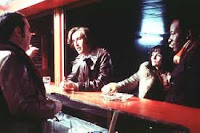It suddenly dawned on me, reading something about Avatar the other day and the references to previous James Cameron movies, that I didn’t think I’d ever seen the original Terminator film from 1984. I know I’ve seen Terminator 2: Judgement Day numerous times. I think we had that one taped and would watch it over school holidays - it’s a great film. I also remember at the time thinking about the fact that I’d never seen the original, but it kept slipping my mind to actually check it out. Maybe I had seen it - I’d never know unless I checked out the DVD and revisited it.
film from 1984. I know I’ve seen Terminator 2: Judgement Day numerous times. I think we had that one taped and would watch it over school holidays - it’s a great film. I also remember at the time thinking about the fact that I’d never seen the original, but it kept slipping my mind to actually check it out. Maybe I had seen it - I’d never know unless I checked out the DVD and revisited it.
Turns out, I’d never seen it. I’d never seen the original Terminator. I’ll be damned.
Cameron co-wrote and directed this breakout sci-fi smash, putting Arnold Schwarzenegger into probably his most famous role and making Linda Hamilton a household name. For a while. Hamilton plays Sarah Connor, soon to become mother of John Connor, father of the anti-machine resistance movement in the 2020s. The machines send a terminator (Schwarzenegger - man, that’s an irritating name to type out. Props to all journalists covering Californian politics) back in time to assassinate Sarah before she can give birth to their arch-nemesis John. The humans manage to sneak in someone to protect her also, sending back soldier Kyle Reese (Michael Biehn) to make sure the terminator can’t have his way.
From this prospect comes a fairly typical action film with a love story undercurrent between Sarah and Kyle. Hopefully nothing is given away by giving away the fact, 26 years after the film’s initial release, that this love affair blossoms and is, in fact, the relationship that begets young John. So, John has sent his own father back in time to protect his mother, posing some intriguing and paradoxical circular ideas of how the past and future could possible interact considering neither the past nor the future could exist without the other. But how could John have sent Kyle back to save his mother if John in fact wouldn’t exist without Kyle having gone back? How could Kyle have begat John in what is, for him, the past if, without being sent back in time by John, who can’t actually exist considering the fact that Kyle isn’t sent back in time until John is, what 43 or something. See what I mean? Best not to think too hard about this and just enjoy the neat conclusions.
It is a rollicking romp or a film. Hamilton is soft and gentle, stepping up rarely and quite emotional throughout the film, really relying on Kyle to see her through the trauma of being pursued by Schwarzenegger’s fairly impressive force. Cameron knows how to keep his stories rolling, and even at this time shows an adeptness with special effects. Sure, they look clunky compared to what could be achieved now, but this was almost three decades ago! Give the man some credit. It’s pretty damned impressive. Schwarzenegger, for his part, plays the role perfectly, considering he doesn’t need to do much more than hulk around and shoot stuff, muttering the occasional dry line of not-really-dialogue, and by nature of his being can’t really exhibit much in the way of expression. Biehn, who must have been quite the heartthrob back in the 80s considering I found him very attractive now despite the hairdo, was suitably dramatic and mysteriously knowing with his representations to Sarah.
All in all, it’s a good film. I knew the story of it, just from picking it up from the sequel and word of mouth, so it was no revelation of understanding as to the story of the terminator and the second installment. But it was nice to finally see it, an enjoyable action film that isn’t as good as the second one but is a tidy little start. 4 stars.




















